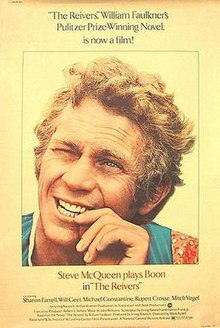| The Reivers | |
|---|---|
 Theatrical release poster | |
| Directed by | Mark Rydell |
| Written by | Harriet Frank Jr. Irving Ravetch |
| Based on | The Reivers, a Reminiscence 1962 novel by William Faulkner |
| Produced by | Irving Ravetch |
| Starring | Steve McQueen Sharon Farrell Will Geer Michael Constantine Rupert Crosse Mitch Vogel |
| Narrated by | Burgess Meredith |
| Cinematography | Richard Moore |
| Edited by | Thomas Stanford |
| Music by | John Williams |
Production companies | |
| Distributed by | National General Pictures |
Release date |
|
Running time | 107 minutes [1] |
| Country | United States |
| Language | English |
| Budget | $5 million [2] |

The Reivers (also known as The Yellow Winton Flyer in the U.K.) [3] is a 1969 Technicolor film in Panavision starring Steve McQueen and directed by Mark Rydell, based on the 1962 William Faulkner novel The Reivers, a Reminiscence . [4] The supporting cast includes Sharon Farrell, Rupert Crosse, Mitch Vogel and Burgess Meredith as the narrator.